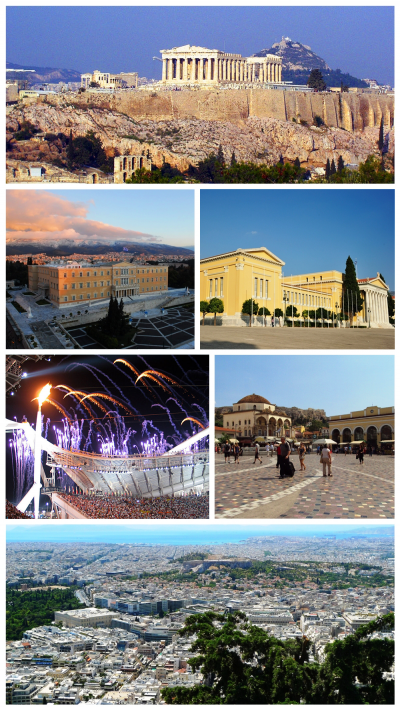George I (Greek: , Gergios I; 24 December 1845 18 March 1913) was King of Greece from 30 March 1863 until his assassination in 1913.
Originally a Danish prince, he was born in Copenhagen, and seemed destined for a career in the Royal Danish Navy. He was only 17 years old when he was elected king by the Greek National Assembly, which had deposed the unpopular Otto. His nomination was both suggested and supported by the Great Powers: the United Kingdom of Great Britain and Ireland, the Second French Empire and the Russian Empire. He married Grand Duchess Olga Constantinovna of Russia in 1867, and became the first monarch of a new Greek dynasty. Two of his sisters, Alexandra and Dagmar, married into the British and Russian royal families. King Edward VII of the United Kingdom and Emperor Alexander III of Russia were his brothers-in-law, and George V of the United Kingdom, Christian X of Denmark, Haakon VII of Norway, and Nicholas II of Russia were his nephews.
George's reign of almost 50 years (the longest in modern Greek history) was characterized by territorial gains as Greece established its place in pre-World War I Europe. Britain ceded the Ionian Islands peacefully in 1864, while Thessaly was annexed from the Ottoman Empire after the Russo-Turkish War (18771878). Greece was not always successful in its territorial ambitions; it was defeated in the Greco-Turkish War (1897). During the First Balkan War, after Greek troops had captured much of Greek Macedonia, George was assassinated in Thessaloniki. Compared with his own long tenure, the reigns of his successors Constantine I, Alexander, and George II proved short and insecure.
Athens ( ATH-inz; Greek: Αθήνα, romanized: Athína [aˈθina] (listen); Ancient Greek: Ἀθῆναι, romanized: Athênai (pl.) [atʰɛ̂ːnai̯]) is the capital and largest city of Greece. Athens dominates the Attica region and is one of the world's oldest cities, with its recorded history spanning over 3,400 years and its earliest human presence beginning somewhere between the 11th and 7th centuries BC.Classical Athens was a powerful city-state. It was a centre for the arts, learning and philosophy, and the home of Plato's Academy and Aristotle's Lyceum. It is widely referred to as the cradle of Western civilization and the birthplace of democracy, largely because of its cultural and political impact on the European continent—particularly Ancient Rome. In modern times, Athens is a large cosmopolitan metropolis and central to economic, financial, industrial, maritime, political and cultural life in Greece. In 2021, Athens' urban area hosted more than three and a half million people, which is around 35% of the entire population of Greece.
Athens is a Beta global city according to the Globalization and World Cities Research Network, and is one of the biggest economic centers in Southeastern Europe. It also has a large financial sector, and its port Piraeus is both the largest passenger port in Europe, and the third largest in the world.The Municipality of Athens (also City of Athens), which actually constitutes a small administrative unit of the entire city, had a population of 664,046 (in 2011) within its official limits, and a land area of 38.96 km2 (15.04 sq mi). The Athens Urban Area or Greater Athens extends beyond its administrative municipal city limits, with a population of 3,090,508 (in 2011) over an area of 412 km2 (159 sq mi). Athens is also the southernmost capital on the European mainland and the warmest major city in Europe.
The heritage of the Classical Era is still evident in the city, represented by ancient monuments, and works of art, the most famous of all being the Parthenon, considered a key landmark of early Western civilization. The city also retains Roman and Byzantine monuments, as well as a smaller number of Ottoman monuments, while its historical urban core features elements of continuity through its millennia of history. Athens is home to two UNESCO World Heritage Sites, the Acropolis of Athens and the medieval Daphni Monastery. Landmarks of the modern era, dating back to the establishment of Athens as the capital of the independent Greek state in 1834, includes the Hellenic Parliament and the so-called "Architectural Trilogy of Athens", consisting of the National Library of Greece, the National and Kapodistrian University of Athens, and the Academy of Athens. Athens is also home to several museums and cultural institutions, such as the National Archeological Museum, featuring the world's largest collection of ancient Greek antiquities, the Acropolis Museum, the Museum of Cycladic Art, the Benaki Museum, and the Byzantine and Christian Museum. Athens was the host city of the first modern-day Olympic Games in 1896, and 108 years later it hosted the 2004 Summer Olympics, making it one of the few cities to have hosted the Olympics more than once.

1863Oct, 30
Danish Prince Vilhelm arrives in Athens to assume his throne as George I, King of the Hellenes.
Choose Another Date
Events on 1863
- 20Jun
West Virginia
American Civil War: West Virginia is admitted as the 35th U.S. state. - 4Jul
Battle of Gettysburg
American Civil War: The Army of Northern Virginia withdraws from the battlefield after losing the Battle of Gettysburg, signalling an end to the Southern invasion of the North. - 8Aug
Battle of Gettysburg
American Civil War: Following his defeat in the Battle of Gettysburg, General Robert E. Lee sends a letter of resignation to Confederate President Jefferson Davis (which is refused upon receipt). - 9Sep
Union Army
American Civil War: The Union Army enters Chattanooga, Tennessee. - 3Oct
Abraham Lincoln
The last Thursday in November is declared as Thanksgiving Day by United States President Abraham Lincoln as are Thursdays, November 30, 1865 and November 29, 1866.

 English
English  español
español  français
français  português
português  русский
русский  العربية
العربية  简体中文
简体中文 